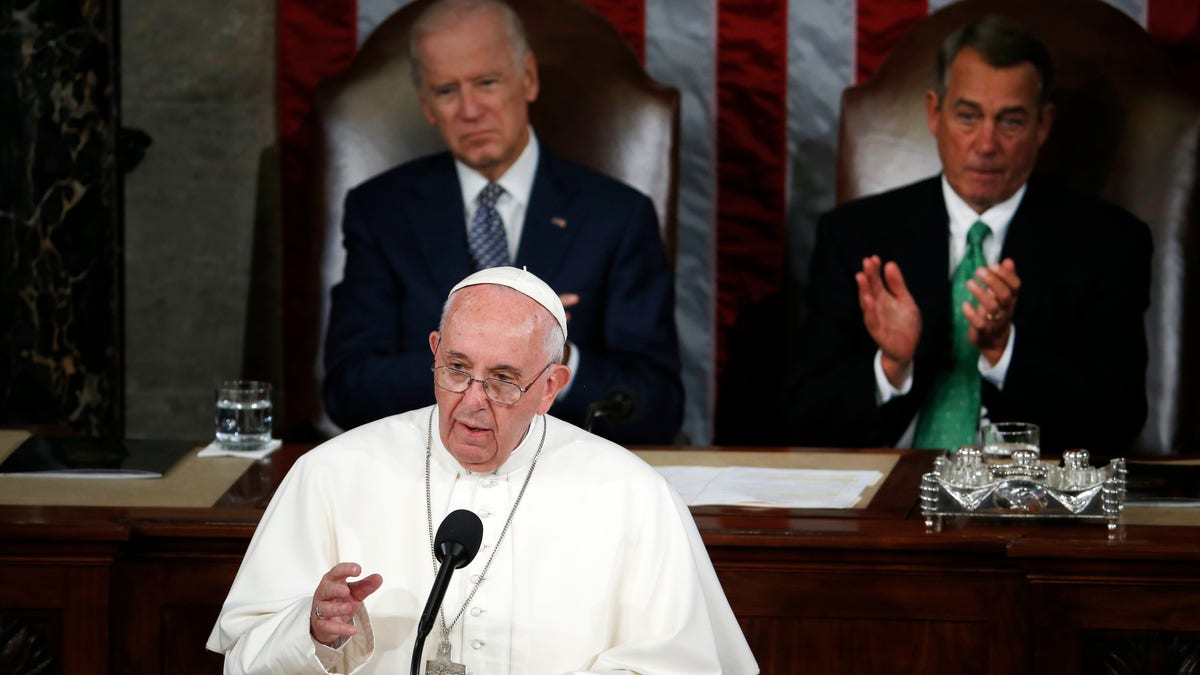
Pope Francis addresses a joint meeting of Congress on Capitol Hill in Washington, Thursday, Sept. 24, 2015, making history as the first pontiff to do so. Listening behind the pope are Vice President Joe Biden and House Speaker John Boehner of Ohio. (AP Photo/Carolyn Kaster)
We commonly say that we live in a culture of self. But what exactly does that mean?
Pope Francis is trying to answer precisely that question. But he clearly wants to do more than that. He also is trying to offer an alternative to the culture of self: we might call it a culture of the soul.
What is the culture of the self as Francis sees it? It is a me-first culture that encourages and rewards self-seeking.
We have created a world that over-values riches and success and where people hold poverty and failure in contempt.
The pope does not seem overwhelmingly interested in God’s will or heaven or transcendence. He seems far more interested in using the teachings of Jesus to help us all be happier in the here and now.
We are consuming the world too fast, Pope Francis has said—and we are also consuming each other.
Our search for wealth and comfort has caused us to despoil nature—to strip it of its bounties, leaving all too little for future generations. But we are not only exploiting nature, we are exploiting and mistreating each other. From the pope’s vantage, we are far too eager to take the old and the sick and the mentally unstable and to cast them aside.
Our culture of self is a war of each against all and collectively we seem to have no wish to do anything about it.
But the pope does. He is on the side of the poor and downtrodden. He insists that whatever else the Church may do it must come to the aid of those who are suffering. He never stops telling us that we are all brothers and sisters and we should begin acting that way now.
Pope Francis does not emphasize heaven. He does not habitually tell us that if we do our duty here on earth, we will have our reward in the afterlife.
No, our reward is here and now. What Pope Francis indicates in almost all his talks is that if we live for others and care for them and love them, we will feel better. We will stop feeling that we are competing with everyone around us, and begin to see that all the people we encounter, and truly all the people in the world, are potentially our friends. The anti-self message of pope Francis is not primarily about a happy-ever-afterlife; it is about a higher form of happiness here and now.
Pope Francis recommends that as often as we can we should leave the state of self and embrace what we might call the state of soul. We get there by doing good works and behaving kindly and using our gifts for the benefit of others. We get there—and then sometimes we tumble back again into the state of self, and so the struggle begins one more time.
The pope does not seem overwhelmingly interested in God’s will or heaven or transcendence. He seems far more interested in using the teachings of Jesus to help us all be happier in the here and now.
The pope’s message is simple and clear: struggling to live a compassionate life is more conducive to human flourishing than the life of self, even at its most enlightened.
What Pope Francis suggests may well be true: heaven is to be found here on this earth, even if it is only to be found in fragments. Failing that, it is probably not to be found at all.








































